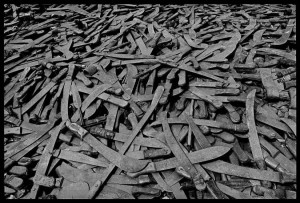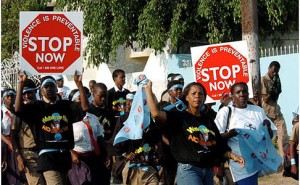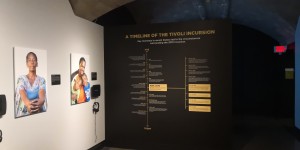
On the Anniversary of a Genocide: What Is Your Idea of Hell?
April 7th, 2019
In Bob Marley’s reflective song “Time Will Tell,” there are the lines:
Time alone – oh, time will tell:
Think you’re in heaven, but you’re living in hell.
Marley was referring to the people he called “baldheads” – those politicians and businessmen (“big men”), whom he considered greedy, corrupt and self-satisfied in their mansions on the hill. In another song, he wanted to “chase them out of town.” They may be comfortable surrounded by luxury, but spiritually they are hollow, Marley suggests. Heaven is not worldly possessions; it is a state of mind, and so is hell.
Well, that’s one concept of “hell” to consider. Marley was a bit of a fundamentalist in some ways.

Machetes were the weapon of choice in the Rwandan genocide. Those who died will bear the physical and mental scars forever.
Sunday, April 7, 2019, is the 25th anniversary of the Rwandan genocide. Or rather, the beginning of it. It lasted for 100 days, into the month of July 1994. Rwanda will mourn for 100 days, marking the length of time during which 800,000 citizens were murdered and raped in an orgy of violence. An online article observed:
The imagining of genocide as hell conveys the impression that the horrors are not fully imaginable. They can only be witnessed in symbolic forms. In addition, such imaginings encourage a moral – or theological – response to an otherwise violent phenomenon spurred by political events.
So, obviously “hell” has a religious and/or moral connotation. I think we simply use the word to describe something that is the absolute worst that one can possibly imagine. It is (or was) used as a relatively mild curse word in England: “Oh, hell!” we said when something went wrong. If we were really annoyed, it was: “Hell’s bells and buckets of blood!” Just an expression of frustration, but rather over the top.
I have no idea where that strange expression comes from. But again, it suggests that hell is not so much a place as a state of mind, as Marley sang. Mental slavery would be hell, as slavery was/is hell.
Yet, hell can definitely be a place. I watched a video of a dusty corner of suburban Tripoli in Libya, with gunfire bursting relentlessly, close at hand. The invaders are at the gate, and hell may be approaching.
And again, hell can be closer to home. An exhibition has opened of photographs of the Tivoli incursion of 2010 at the Penn Museum in Philadelphia. It is called: Bearing Witness: Four Days in West Kingston. A Jamaican who works in the health sector commented on that piece of hell on Twitter recently:
I worked at the hospital that day…and saw multiple bodies coming in dead. It had a serious effect on me…I knew the truth. It’s not a spin it’s reality and it is the reason our crime continues regardless of political affiliations.
I reflected on the impact of violence on Jamaican society. In the last decade, 10,000 – 15,000 Jamaicans have been murdered, I am reminded. Where do these incidents of extreme violence come from, I wonder? Could it be that they emerge when there is a general acceptance of violence as an everyday thing, to the point where it becomes mundane? We need to guard against this; we must be vigilant and always seek the non-violent way.
This includes violence in our everyday language. I was disturbed recently by one media house’s depiction of the recent by-election in East Portland as a “battleground.” The militaristic imagery was repeated over and over. Efforts to bring out voters in the constituency were described as “hand to hand combat.” Of course, the election was hotly contested – but why introduce the language of violence?

Violence IS preventable. The Rwandan genocide was preventable, as was Tivoli Gardens. (Photo: Violence Prevention Alliance Jamaica)
I have to confess – I am feeling a little gloomy this Sunday afternoon! So, let us end on a more hopeful note – a quote from the Dalai Lama. Perhaps this kind of education could be the beginning of the end to our descent into that darkness of the soul that is the real hell:
I am hopeful that a time will come when we can take it for granted that children will learn, as part of the curriculum, the indispensability of inner values: love, compassion, justice, and forgiveness.
Tags: Bob Marley, children, Dalai Lama, education, genocide, human rights, journalism, Libya, Penn Museum, Rwanda, social media, Tivoli Gardens, Tripoli, United States, violence, Violence Prevention Alliance, West Kingston
The Gleaner reserves the right not to publish comments that may be deemed libelous, derogatory or indecent.
To respond to The Gleaner please use the feedback form.
- We Are the Zoomers
- Living Online with Humans and Birds: NAOC 2020
- Human Trafficking and the Problem of Public Education
- Down Memory Lane
- Are We Ready to Recover from COVID-19?
- Road Safety Matters: Is Your Vehicle Safe?
- Sexual Harassment, Me Too, and the Minister’s Disturbing Giggle
- The Vulnerable Senior Citizens, Private Care Homes and COVID-19
- A Muddle Over Masks
- Here is Something Life-Saving You Can Do: Give Blood!



